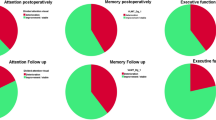Abstract
Cognitive dysfunction is common in patients with primary brain tumors, and may have a major impact on activities of daily living and on quality of life. This is the first prospective study that investigated the incidence and severity of cognitive dysfunction in meningioma patients before and after surgery, and the change in dysfunction over time, both at group and individual patient level. Sixty-eight meningioma patients were neuropsychologically tested one day before brain surgery. Sixty-two patients were followed up 3 months after surgery. All patients were assessed with a brief (30 min) computerized screening battery of neuropsychological tests (i.e., CNS Vital Signs). Pre- and post-operatively, meningioma patients demonstrated significantly lower scores in all cognitive domains; memory, psychomotor speed, reaction time, complex attention, cognitive flexibility, processing speed, and executive functioning, in comparison with normative data. Pre-operatively, 47 out of 68 patients (69 %) scored low or very low in one or more cognitive domains. Post-operatively, 27 out of 62 patients (44 %) scored within this range. Test performance improved in all cognitive domains post-operatively, with the exception of psychomotor speed and reaction time. In line with previous studies with conventional neuropsychological tests, meningioma patients are faced with cognitive dysfunction in several cognitive domains both pre- and post-operatively. However, a large proportion of patients shows post-operative improvement in cognitive functioning. Longer-term follow-up is recommended to identify potential predictors of cognitive improvement after surgery. Diagnosis and treatment of these cognitive deficits will improve outcomes and quality of life in meningioma patients.


Similar content being viewed by others
References
Taphoorn MJB, Klein M (2004) Cognitive deficits in adult patients with brain tumors. Lancet Neurol 3(3):159–168
Shen C et al (2012) Cognitive deficits in patients with brain tumor. Chin Med J 125(14):2610–2617
Tucha O et al (2003) Preoperative and postoperative cognitive functioning in patients with frontal meningiomas. J Neurosurg 98(1):21–31
Dijkstra M et al (2009) Late neurocognitive sequelae in patients with WHO grade I meningioma. J Neurol Neurosurg Psychiatry 80(8):910–915
van Nieuwenhuizen D et al (2013) Neurocognitive functioning and health-related quality of life in patients with radiologically suspected meningiomas. J Neurooncol 113(3):433–440
Yoshii Y et al (2008) Cognitive function of patients with brain tumor in pre- and postoperative stage. Surg Neurol 69(1):51–61
van Nieuwenhuizen D et al (2007) Differential effect of surgery and radiotherapy on neurocognitive functioning and health-related quality of life in WHO grade I meningioma patients. J Neurooncol 84(3):271–278
Krupp W et al (2009) Assessment of neuropsychological parameters and quality of life to evaluate outcome in patients with surgically treated supratentorial meningiomas. Neurosurgery 64(1):40–47
Tucha O, Smely C, Lange KW (2001) Effects of surgery on cognitive functioning of elderly patients with intracranial meningioma. Br J Neurosurg 15(2):184–188
Gualtieri CT, Johnson LG (2006) Reliability and validity of a computerized neurocognitive test battery, CNS Vital Signs. Arch Clin Neuropsychol 21(7):623–643
Snaith RP, Zigmond AS (1986) The hospital anxiety and depression scale. Br med j (Clin res ed.) 292(6516):344
Snaith RP (1987) The concepts of mild depression. Br J Psychiatry: J Ment Sci 150:387–393
Spinhoven P et al (1997) A validation study of the Hospital Anxiety and Depression Scale (HADS) in different groups of Dutch subjects. Psychol Med 27(2):363–370
Meskal I et al (2014) Cognitive deficits in patients with trigeminal neuralgia: opportunities to improve care and quality of life. Acta Neurochir 156(8):1565–1566
Wahlstorm M, Boersma FJ (1968) The influence of test-wiseness upon achievement. Educ Psychol Meas 28:413–420
Bouma AMJ, Lindeboom J, Schmand B (2012) Handboek neuropsychologische diagnostiek, vol 2. Pearson, Amsterdam
Iverson GL et al (2009) Does familiarity with computers affect computerized neuropsychological test performance? J Clin Exp Neuropsychol 31(5):594–604
Gehring K et al (2009) Cognitive rehabilitation in patients with gliomas: a randomized, controlled trial. J Clin Oncol 27(22):3712–3722
Verhage F Intelligentie en leeftijd Onderzoek bij Nederlanders van twaalf tot zevenenzeventig jaar. [Intelligence and age: Research study in Dutch individuals age twelve to seventy-seven]. 1964: Assen: Van Gorcum/Prakke & Prakke
Cohen J (1992) A power primer. Psychol Bull 112(1):155–159
Acknowledgments
We would like to thank all of the nurses and clinical assistants of the department of Neurosurgery.
Conflict of interest
None of the authors have any conflict of interests to declare.
Author information
Authors and Affiliations
Corresponding author
Rights and permissions
About this article
Cite this article
Meskal, I., Gehring, K., van der Linden, S.D. et al. Cognitive improvement in meningioma patients after surgery: clinical relevance of computerized testing. J Neurooncol 121, 617–625 (2015). https://doi.org/10.1007/s11060-014-1679-8
Received:
Accepted:
Published:
Issue Date:
DOI: https://doi.org/10.1007/s11060-014-1679-8




